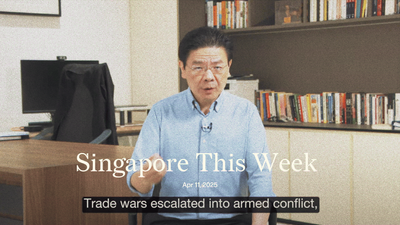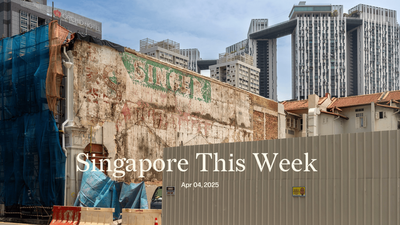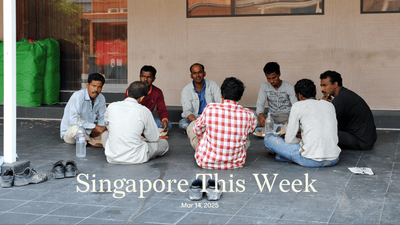Business: Was Singapore too lenient towards corrupt Keppel executives?
Six former senior management staff of Keppel Offshore & Marine Ltd (KOM) paid a total of US$55m in bribes to Brazilian state officials from 2001 to 2014 to secure 13 large contracts there, which led directly to profits of over US$350m for KOM. While KOM eventually paid fines of US$422.2m (S$570m), the six, for their roles in one of Singapore’s biggest ever corruption cases, were handed “stern warnings” on January 11th by the Corrupt Practices Investigation Bureau (CPIB). Singaporeans were shocked at this seeming reprieve and the fact that the executives weren’t named (though The Online Citizen dug around and identified them). This week, in a scathing critique published on Wednesday in Singapore Law Watch (SLW), senior counsel Harpreet Singh rebutted CPIB’s reasoning for not prosecuting any of the six, saying that: just because a corruption scheme is complex and transnational does not justify non-prosecution; there is already a large body of evidence accessible to prosecutors (partly from KOM’s admissions to the US’s Department of Justice); Singaporean authorities have recourse to international assistance from their foreign counterparts; CPIB has extensive investigative powers over the six; and CPIB can employ advanced digital forensic tools to examine e-mails, chats and the like. Singh concluded by saying that the enforcement of Singapore’s anti-corruption laws must extend to “...all senior executives and board members (including those at the ultimate parent of group companies) who are aware of and who either condone the illicit payments or turn a blind eye towards them.” In response, Indranee Rajah, minister in the Prime Minister’s Office, said on Facebook on Thursday that “some people have made assertions” based on an “inadequate understanding of the facts…” Indranee added that she would explain the facts at the next parliamentary sitting on February 6th and “allow the public to decide for themselves.” SLW removed Singh’s commentary on Thursday. It’s unclear who ordered the take-down. Singh has since reproduced it on his Facebook page. If Indranee subsequently reveals more in Parliament than we currently know, Singh might feel vindicated—and Singaporeans will better understand what’s needed to provoke transparency.
Society: Ageing with dignity, not desperation
By 2030, one in four people here will be 65 and above (compared with one in three in Japan, an older society; and one in twelve in Indonesia, a younger one). To tackle this inevitability, the government has launched the Live Well, Age Well programme—run by the Health Promotion Board and People’s Association—to further empower seniors to improve, manage and maintain their health. It’s an update of the Republic’s 2015 Action Plan for Successful Ageing. Ageing is “the most significant social development” in Singapore, said Ong Ye Kung, the health minister. Age-related government spending is set to rise, on initiatives like medical and social subsidies, wellness programmes, active ageing centres, and funding to make medical services more accessible. But Ong called for civil society to chip in too since ageing is a “societal phenomenon requiring a societal response.” The plan was informed by key respondent concerns about ageing, including discrimination at work, rising cost of living, keeping up with technology, staying productive and contributing to society. The Manpower Ministry will extend the senior employment credit scheme for two years to 2025. This provides wage offsets to employers who hire Singaporeans aged 60 and above, earning up to S$4,000 a month. All this is important for seniors who work as a way to keep active and engaged with the community. But others work not by choice but for survival. (And definitely not “as a form of exercise”, as Tan Chuan Jin, speaker of the house, said in 2015.) Living on the fringes of society and often alone, they work in low-skilled, laborious jobs—for instance, as cleaners and cardboard collectors. Active ageing doesn’t preclude ageing with dignity. An enlightened approach, with a sufficiently strong safety net, would enable seniors to work out of desire, not desperation.
Society: “Tak Boleh Tahan!”
Over the past 15 years, a colloquial Malay phrase has evolved into a rallying cry for Singaporeans upset with the rising cost of living. Last Sunday saw the first of a three-part townhall series, “Tak Boleh Tahan! 2023”, organised by Manifestival, a joint effort by various civil society organisations and independent media platforms. Translating roughly to “I just can’t take it anymore”, the series pays homage to the 2008 campaign of the same name, in which some 20 people, including Chee Soon Juan, current leader of the Singapore Democratic Party (SDP), protested against Singapore’s escalating cost of living at the Parliament House, wearing red t-shirts printed with the slogan. (Predictably, the police arrested and charged some.) Singaporeans today are increasingly despondent about the cost of living given global inflation, a GST hike, and the huge recent foreign demand for housing. Featured speakers at last Sunday’s townhall—held at Chee’s cafe—included Marlina, a mother of five who who runs a home-based snack business in a rental flat neighbourhood, and Shabir, a father of two and crane operator. Their lived experiences are valid, sobering, and add necessary depth to the dry statistical proclamations from politicians and economists. As the cost of living, or as the moderator Suraendher Kumarr put it, “the dollars and cents required to stay alive” escalates, who’s made even more vulnerable and who remains protected? The second townhall will discuss the retirement age and the Central Provident Fund system while the third focuses on housing. For updates, follow Manifestival on Eventbrite.
Arts: Pauper in the Palace
The Van Gogh Museum might be in Amsterdam but Van Gogh: The Immersive Experience is in Resorts World Sentosa. Billed as a “multisensorial exhibition”, the show is a combination of light show, virtual reality, and pure spectacle. Audiences can expect to be acquainted with Van Gogh’s biography and over 300 of his artworks along with trying their hand at emulating the artist’s bold and expressive style. Van Gogh is undoubtedly one of the most prominent figures in Western art history but he died in 1890, over a hundred years ago. What else could have been done with the resources poured into interpreting work that already exists on fridge magnets around the world? Van Gogh: The Immersive Experience opens in March though tickets are only available from April onwards due to high demand.
Arts: Brown is unleashed
Checkpoint Theatre is opening its 2023 season with a production that explores race and masculinity in Singapore. Titled “Brown Boys Don’t Tell Jokes”, the work is a new play by Checkpoint Theatre Associate Artist Myle Yan Tay. Tay previously directed “Brown Is Haram”, a performance-lecture about being brown in Singapore, and edited the book “Brown is Redacted”, which was inspired by it (Jom published an excerpt from it last year). In “Brown Boys Don’t Tell Jokes”, five friends catch up on the eve of an election and reflect on the different paths their lives have taken. The ensemble cast is made up of relatively new faces, such as Gosteloa Spencer, Krish Natarajan, Adib Kosnan and Shahid Naseer, alongside television and theatre mainstay, Ebi Shankara. The production runs from March 23rd-April 2nd at the National Library’s Drama Centre Black Box. Tickets are available via SISTIC.
History weekly by Faris Joraimi
This week marks the 60th anniversary of Operation Coldstore, in which over 120 individuals were detained without trial on February 2nd 1963. The hero’s narrative—of the ruling People’s Action Party overcoming a communist threat—remains in our history books. However, historian Lysa Hong, together with former trade unionist and lawyer Tan Jing Quee as well as historian PJ Thum, among others, have led a critical reassessment of this narrative over the last decade. They’ve met with reprisal: branded “revisionist”, a word used in Mao’s China to silence critics. Yet, the individuals actually detained under Coldstore have themselves reclaimed their narratives in recent years. Dr Poh Soo Kai, a leader of Barisan Sosialis, gave his version of events in a memoir. Many of the former detainees have been meeting every Chu San (third day of the Lunar New Year) for the last decade to reconnect with old comrades. The first, held at Hong Lim Park saw many ex-detainees try to find their names in a list they nicknamed the “Roll of Honour”. The number of attendees has steadily grown since. While Dr Poh was absent at this year’s Chu San, his speech was read out for attendees at the gathering last Tuesday, where he called those present “the youth that launched the constitutional and non-violent struggle for a genuine independent Singapore that would be free from colonial fetters.” This movement, he said, was “brutally truncated” when Coldstore happened. Some present-day activists, including anti-death penalty advocates Kokila Annamalai and Rocky Howe, were present. On Facebook, Koki called former naval base union leader Michael Fernandez her “comrade”, to which the latter agreed. These Singaporeans may be of different generations, but share in a tradition of struggle for Merdeka that transcends time, that is so ingrained in the history of Malaya. It is “ours to claim, ours to continue,” as Koki said.
Tech: Flywire to operate in Singapore
Flywire has received in-principle approval for its Major Payment Institution licence from the Monetary Authority of Singapore. The US-based fintech firm, backed by Temasek, was founded in 2009 and provides solutions for clients in the B2B, healthcare, education, and travel industries. With over 2,800 clients in more than 240 countries, Flywire is well-positioned to take advantage of the growing global digital payment market, which is expected to reach S$361.3bn by 2030. The licence enables Flywire to offer domestic money transfer services, merchant acquisition services, and cross-border money transfer services. The fintech firm has made significant investments in the Asia Pacific region, acquiring Australian payments provider Cohort Go and expanding its teams in Tokyo, Singapore, and Shanghai. The growth of fintech companies like Flywire augurs well for the employment market in Singapore—as it creates new job opportunities amid job cuts in the tech industry—and for Singapore’s aspirations to establish itself as a fintech hub in South-east Asia.
Tech: Comfortably green
Singapore-based taxi giant ComfortDelGro has invested €4m (S$5.7m) into Shift4Good, becoming the impact fund’s first strategic investor in South-east Asia. Shift4Good focuses on companies that can help reduce carbon emissions and promote sustainable mobility. In October 2022, it announced the first close of Fund I at US$98.2m (S$128.9m), investing mostly in start-ups at the series A and B stages. Other investors include the European Investment Fund and car manufacturer Renault Group. ComfortDelGro stated that it will evaluate the start-ups targetted by Shift4Good and make investments either on its own or through the fund. Its CEO, Cheng Siak Kian, stated that the investment is part of its “future-proofing plans”. Given that the transport of people and goods has a carbon impact of 8bn tonnes each year globally, ComfortDelGro is committed to minimising the environmental impact of its operations and has set a target to reduce carbon emissions by one to three percent over the next one to three years. ComfortDelGro has a transition plan to shift its fleet from traditional internal combustion engine vehicles to electric, hybrid-electric, and hydrogen vehicles. It has set carbon emission targets consistent with the goal of limiting global warming to 1.5°C above pre-industrial levels, the most ambitious goal of the Paris Agreement. ComfortDelGro’s investment in Shift4Good is a laudable attempt by a very traditional taxi company’s attempt to reduce its environmental impact by investing in technology.
Tech: Grab offers partner cash advance, names new CPO
Easing the financial burden for private-hire drivers in Singapore, Grab has launched a new programme called Partner Cash Advance, offering cash advances to its driver-partners for up to S$10,000. But at what cost? The minimum amount for the advance is S$760, while the maximum and tenure varies based on the driver’s behaviour and number of completed rides. Repayment will be automatically deducted from the driver’s earnings on a weekly basis, with the tenure ranging from three to nine months. One estimate suggested the terms are comparable to a loan with an effective interest rate of 18 percent per annum. Despite the convenience of the programme, there are concerns about the ethical and moral implications, as well as the added stress it may place on drivers who are already working long hours just to earn a good wage. A survey by the Institute of Policy Studies found that private-hire drivers in Singapore work an average of 59 hours a week and 40 percent of platform workers are unhappy with their working hours. Separately, Grab has named Philipp Kandal as its new chief product officer. In his new role, Kandal will oversee the tech giant’s product, design, and analytics teams. He will also spearhead Grab’s product vision and strategy initiatives. Previously, he led the development of GrabMaps which makes the Grab ecosystem more effective by removing the “tens of millions of dollars” in estimated annual third-party mapping fees.
If you enjoy Jom’s work, do get a paid subscription today to support independent journalism in Singapore.







